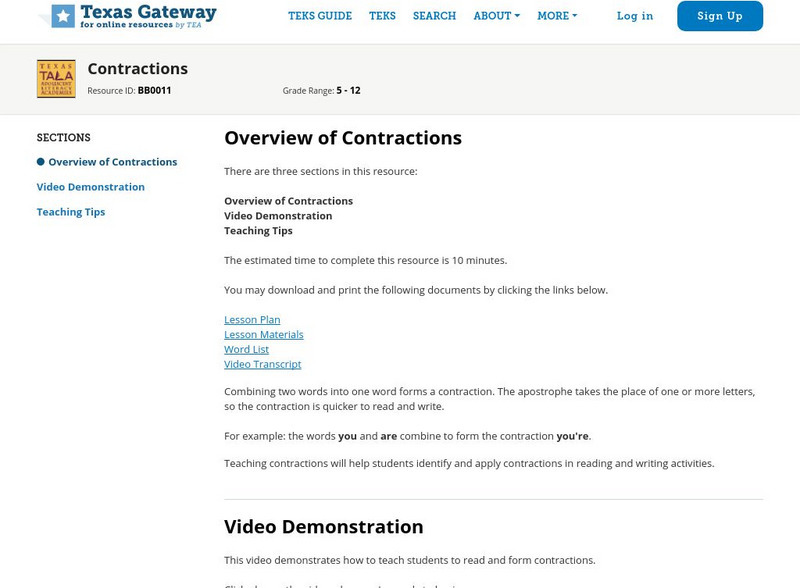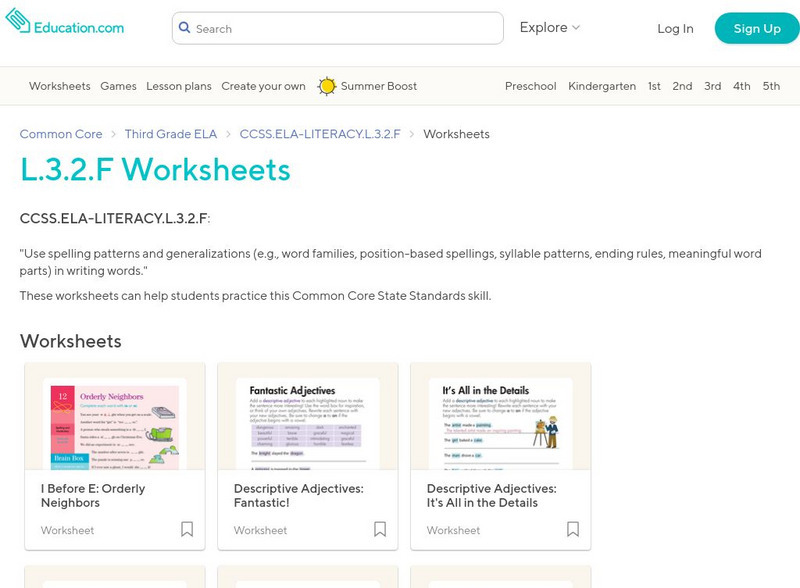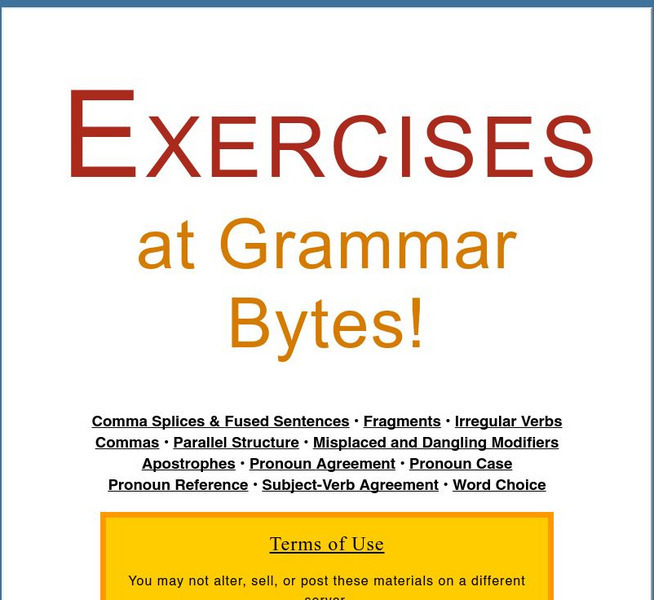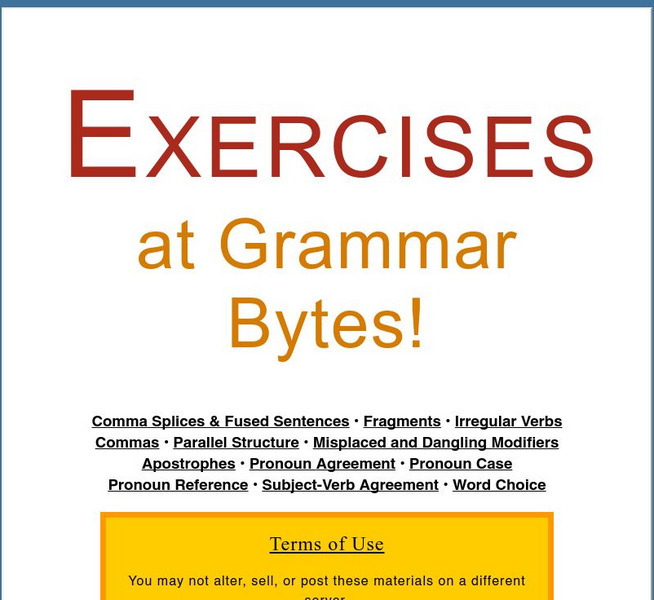Goodwill
Gcf Global: Capitalization
In this lesson, students learn when to use capitalization in their writing.
PBS
Pbs: No Nonsense Grammar: Using Proper Punctuation for Titles
This video focuses on correctly punctuating titles. Small works (short stories, essays, magazine and newspaper articles, etc.) are indicated with the use of quotation marks. Larger works, such as books or movies, are indicated either...
Texas Education Agency
Texas Gateway: Overview of Contractions
This resource has three sections: Overview of Contractions, video demonstration and teaching tips. It provides downloads of the following: lesson plan, lesson materials, word list, and video transcript.
Other
Reading From Scratch: Spelling Rules
The "Reading from Scratch" site provides a list of spelling rules with examples.
Education.com
Education.com: L.3.2.f Worksheets: Use Spelling Patterns and Generalizations
[Free Registration/Login Required] A site with links to 30 worksheets that can be downloaded and printed for student use while building skills with standard L.3.2.F: Use spelling patterns and generalizations (e.g., word families,...
BBC
Bbc: Skillswise: Plurals and Spelling Rules
The rules for spelling plural words and using them properly in English are made fun and easy with this BBC Skillswise worksheet for students.
Fun Brain
Fun Brain: Spell Check
In this game, students are given 20 sets of four words and asked to click on the misspelled word in each set and type in the correct spelling. If students answer all 20 correctly, they can add their name to the leaderboard. There are two...
CK-12 Foundation
Ck 12: 1.4: Sometimes a Vowel, Sometimes a Consonant:
[Free Registration/Login may be required to access all resource tools.] Spelling rules with examples for words that contain the letter "u."
Love To Know Media
Your Dictionary: 2nd Grade Lesson Plans for Forming Possessives
This article focuses on teaching 2nd graders to form possessive. It provides two complete lesson plans with activities for teaching them how to form possessives.
Fun Brain
Fun Brain: Spell Check
Students are presented with four words. After choosing the incorrectly spelled word, students make corrections and check their answers. There is an option for more difficult words.
PBS
Pbs Learning Media: Using Reference Materials to Correctly Spell Words
Some words may sound like other words, but using the wrong word can lead to confusion and madness. A dictionary would be helpful to make sure you know what you're talking about! [0:40]
PBS
Pbs Learning Media: How to Introduce Lists and Quotes With Colons
Colons are punctuation marks that can signal a quotation. However, to use colons correctly, whatever comes before the colon must be a complete sentence. Know when and how to use colons! [0:45]
PBS
Pbs Learning Media: Using Punctuation for Breaks and Pauses
Punctuation indicates how one should read any sentence. Commas, for example, indicate when a reader should take a brief pause, either for emphasis or for comprehension. [0:40]
PBS
Pbs Learning Media: How to Punctuate Items in a Series
Another way to confuse readers or audiences is not using commas and conjunctions when listing items in a series. Always use a comma in between items in a series, and use a conjunction before adding the last item in a list. [0:44]
PBS
Pbs Learning Media: Forming and Using Possessive Nouns
Possessives show when a noun belongs to someone. It is often indicated with an apostrophe "s", but when words end in "s" only an apostrophe is added.
PBS
Pbs Learning Media: Some Frequently Confused Words
Some words in English can look and sound similar, but have entirely different meanings. Keep an eye and ear out for them; beware of commonly confused words. [0:40]
Khan Academy
Khan Academy: Frequently Confused Words: Too to Two
Can you tell the difference between the words 'to,' two,' and 'too'?
Khan Academy
Khan Academy: Choosing Between Its and It's
This is one of the most common slip-ups you can make in English! Let's give it a shot.
Khan Academy
Khan Academy: Three Ways to End a Sentence
There are three types of terminal punctuation: a period, an exclamation point, and a question mark.
Primary Games
Primary Games: Treasure Trove
This activity focuses on students understanding of contractions. Students read the word on the treasure chest, then select the correct contraction to open the treasure.
Robin L. Simmons
Grammar Bytes: Commas
This site offers links to five interactive practices using commas and accompanying handouts. Adobe Reader is required.
Robin L. Simmons
Grammar Bytes: Word Choice Exercises
Students engaging in these 14 word choice exercises will improve their word usage skills. Topics include spelling mistakes, sound alike words and word confusion. Select the correct word usage for each sentence.
Robin L. Simmons
Grammar Bytes: Irregular Verbs
This site offers links to six interactive exercises on irregular verbs each with an accompanying printable handout.
Courseware Solutions
Wordville: Commas: A Fun Way for Kids to Practice Using Commas
In this activity, students add commas as needed to friendly letters. As they click where the commas belong a dragonfly or a butterfly inserts the commas.














